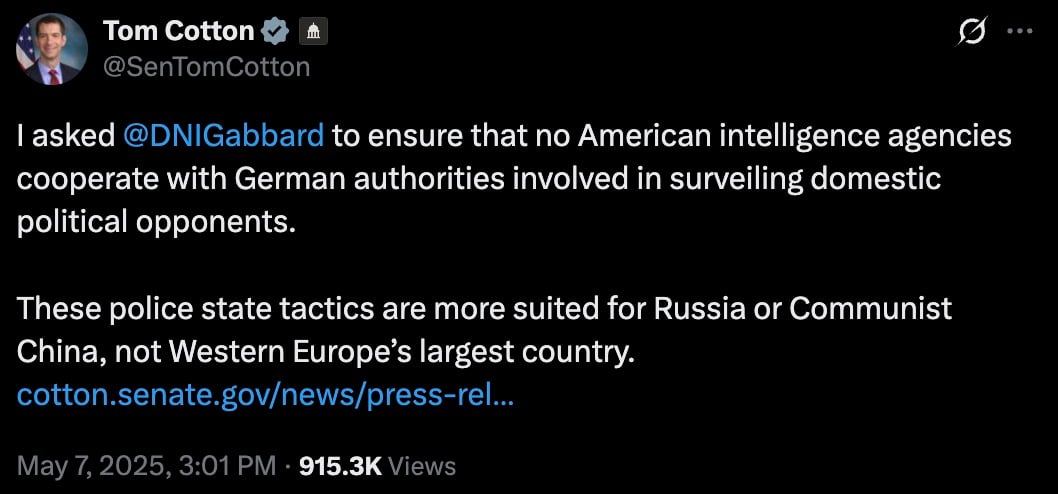Germany’s Federal Office for the Protection of the Constitution (BfV) has walked back its designation of the Alternative for Germany (AfD) as a “proven far-right extremist organization,” halting the surveillance activities tied to that classification while a legal challenge from the party proceeds.
This decision comes amid heightened transatlantic tensions and mounting concerns over political surveillance practices.
The move follows a formal request by US Senator Tom Cotton, who called on the Director of National Intelligence, Tulsi Gabbard, to suspend intelligence cooperation with Germany. Citing what he described as the misuse of intelligence tools for political targeting, Cotton emphasized that actions such as monitoring, infiltration, and surveillance of opposition parties are reminiscent of authoritarian regimes, not democratic allies.

“Rather than trying to undermine the AfD using the tools of authoritarian states, Germany’s incoming government might be better advised to consider why the AfD continues to gain electoral ground,” he wrote.
A heavily redacted 17-page excerpt of a 1,100-page BfV report was made public recently, offering a glimpse into the material used to justify the AfD’s designation. The cited content includes social media posts, party statements, and commentary from AfD leaders like Alice Weidel. Many of these are deemed by the agency to be “anti-constitutional,” referencing criticisms of multiculturalism, violent crime, and immigration, including statements linking multiculturalism to societal breakdown and crime. The full report remains unpublished.
Interior Minister Nancy Faeser, in one of her final acts before leaving office, had authorized the publication of a press release referencing the BfV’s extremist classification of the AfD. That release will now be withdrawn, and the agency has committed not to publicly label the party as far-right while court proceedings are ongoing.
According to the BfV, “The defendant will not publicly describe the AfD as ‘certified far-right’ until a decision is made in this expedited court hearing.” This concession appears to reflect growing pressure both from within Germany and abroad.
Free speech attorney Joachim Steinhöfel described the development as “a complete surrender by the German domestic intelligence service,” telling the NIUS outlet that responsibility must be taken at high levels within the agency. He also noted that external influence played a key role in the outcome, stating, “We also have to thank the Americans for exerting massive pressure.”
AfD co-chair Alice Weidel echoed that sentiment, reacting to the developments by tweeting: “No more US intelligence support for Stasi spying methods against the AfD.”
Germany’s intelligence services, constrained by strict domestic privacy laws, often rely on support from foreign agencies like the NSA for signals intelligence. With the US now reevaluating its cooperation, questions are mounting about the appropriateness of surveillance mechanisms targeting political entities.
Statements from US officials have reinforced that skepticism. Secretary of State Marco Rubio denounced Berlin’s actions as undemocratic, while Vice President JD Vance criticized what he characterized as persecution of the opposition. The chorus of concern signals a growing rift over democratic norms and the use of intelligence infrastructure against domestic political opponents.










